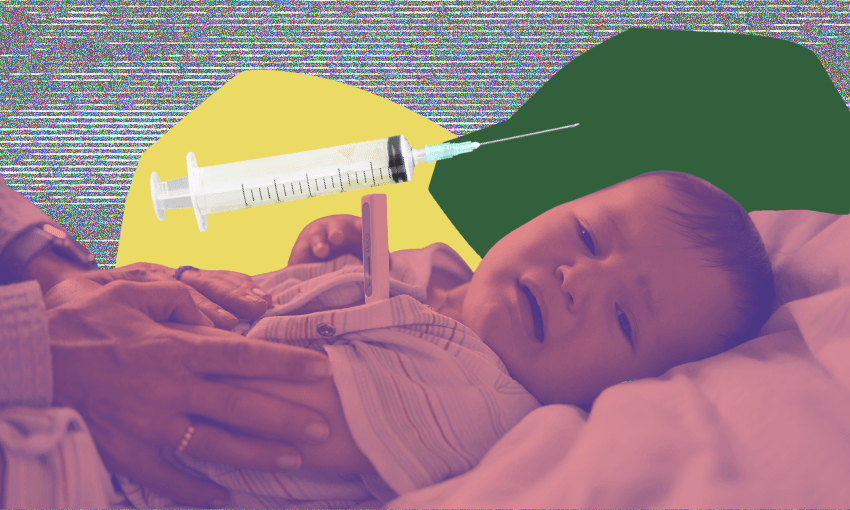Each year, hundreds of New Zealand babies are hospitalised with this common respiratory virus, and health experts are concerned that preventative drugs used overseas are not being funded here.
As winter approaches and people spend more time indoors, respiratory viruses start circulating. One common bug is RSV, or respiratory syncytial virus, which hits vulnerable babies and older people particularly hard. In some cases, this causes severe illness, leading to hospitalisation.
Preventative treatment for RSV exists; in fact, New Zealand doctors and patients at Middlemore in Auckland were part of a global trial of an RSV vaccine that protects babies against the illness by vaccinating pregnant mothers. While this vaccine has been approved in the US and European Union, it is not yet available in New Zealand. There’s also a treatment called palivizumab which has been approved by Medsafe since 2000 and was offered to the most vulnerable babies in New Zealand from 2021 to 2023, while another treatment called nirsevimab provides longer-lasting immunity yet isn’t available in New Zealand at all. However, parts of Australia, as well as at least 10 countries in Europe and the Americas, have funded it for use in national immunisation programmes.
Here’s a quick guide to why RSV is a concern, and the treatments available to prevent it.
What are the symptoms of RSV?
In most people, RSV just seems like a common cold: snotty nose, dry cough and sneezing, mild fever and a sore throat. Most children over 12 months and healthy adults who contract the virus will experience these symptoms.
However, for those with immune disorders, heart or lung disease and particularly young and premature babies, the sickness can be much worse: it infects the lungs, making it hard to breathe. Estimates suggest that 2-3% of infants who contract it need to be hospitalised with RSV, and there are longer-term effects, like a strong link to asthma. It’s a disease that intersects with other health inequities; Māori and Pasifika whānau are more impacted by the disease.
Have we had a major outbreak before?
RSV infects people every winter, causing hundreds of babies to be hospitalised. In Kidz First, the children’s hospital attached to Middlemore in South Auckland, 380 infants under the age of two were hospitalised with RSV last year.
In 2021, with an “immunity debt” after lockdowns, a much higher than usual number of kids were hospitalised with RSV, with more than 2,000 cases around the country in early July – much more than the usual average of 1,743 for the whole year.
What preventative treatments are available?
Because RSV is common, most people who have been infected have already developed antibodies simply from being exposed to the virus. However, newborn babies at risk of infection don’t always have time to generate enough antibodies to protect them, even if they are exposed to a weakened form of the virus in a traditional vaccine. Instead, babies can be protected with a maternal vaccine (where their mum generates the antibodies while pregnant) or manufactured antibodies (known as monoclonal antibodies).
The palivizumab treatment administers manufactured antibodies by injections to young children, but the protection only lasts a month, so babies and their parents have to return repeatedly to the hospital during RSV season. This is very expensive and time consuming, so the treatment is only given to the most vulnerable babies. Palivizumab was temporarily funded for the most vulnerable babies, but the programme ended last year.
A newer treatment, nirsevimab, is longer acting; it can remain in the body for months, meaning only one injection is needed. In one clinical trial, babies who had received nirsevimab had 75% fewer RSV infections over five months. Western Australia and Queensland are now funding nirsevimab for all babies under eight months and older babies who have increased risk too, while New South Wales is offering it to vulnerable babies.
Why aren’t these treatments available in New Zealand?
Money and financial constraints mean that these medications aren’t available for vulnerable children in New Zealand.
In an article on The Conversation, a group of paediatricians explained another barrier to nirsevimab becoming available here: because it’s not a standard vaccine, the approval process is less clear. It’s currently not funded by Pharmac, nor approved by Medsafe.
In a statement to media, Pharmac’s chief medical officer, David Hughes, said that Sanofi, the supplier of nirsevimab, had not applied for funding. However, the drug agency has been in touch with Sanofi; if it applied, the drug could be evaluated by Medsafe and Pharmac at the same time.
Palivizumab was funded from 2021 to 2023 as part of ring-fenced funding created as part of the Covid response; it was expected that these seasons would be more severe as immunity would have reduced during lockdowns. While paediatricians called for funding to continue, as it seemed that there had been fewer hospitalisations as a result, Pharmac said there was limited evidence that the drug reduced the number of deaths. Hughes said that while the agency is not currently able to fund palivizumab, it is on the “options for investment” list, meaning it’s a drug the agency would like to fund when money is available.
The maternal vaccine that was trialled in New Zealand in 2022 had successful early results, and has been approved by the FDA – the equivalent of Medsafe in the US. However, it’s not available or funded here yet.
Paediatricians and other health experts have called for the New Zealand government to fund these treatments so that the protection is equally available to all children who need it.



